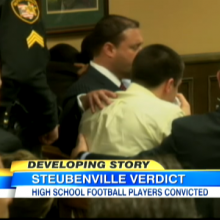rape culture

Image via Mikkel Bigandt/Shutterstock.com
Brock Turner’s case is not an isolated incident of a poor judge or a flawed judicial system. The roots of Brock Turner’s three month sentence goes deeper than the courtroom in Santa Clara, Calif. These roots extend deeply into the soil of power, privilege, and patriarchy — systems actively formed, in part, by misdirected Christianity. Eldredge, Harris, Driscoll, and Piper are only four recent examples of a harmful narrative that has been preached for centuries.
Former Stanford swimmer Brock Turner made headlines when he received a six month prison sentence for raping an unconscious woman behind a dumpster. Turns out, he will only serve half of his already very short sentence, reports Mic.
A document on the Santa Clara County Department of Corrections lists his release date as Sept. 2, 2016.
A judge has ordered that Bill Cosby stand trial for charges in a case of sexual assault. According to Reuters, a Pennsylvania judge decided "that there was enough evidence for the entertainer to be criminally tried on charges that he attacked a woman in 2004 after giving her drugs."
The woman is Andrea Constand, a former Temple University staff member who alleges that Cosby gave her pills and assaulted her in his home in 2004. More than 40 women have come forward with similar allegations, but Constand's case is the only one that has resulted in criminal charges filed; in fact, for many, the statute of limitations prevents it.
In a powerful introduction to an even more moving song from Lady Gaga, Vice President Joe Biden appeared at the Oscars Feb. 28 in a plea to “change the culture” and ensure that “no abused woman or man…ever feel they have to ask themselves ‘what did I do?’”
IN THE COURSE of a few months in the past year, I learned that three women and men close to me had been sexually assaulted—as children and as adults. Hearing their stories broke me out of many of the lies surrounding rape that I had fallen into without even realizing it.
Kate Harding’s Asking for It attacks the same lies and misconceptions. She explores how we, as a culture, embrace myths surrounding rape and sexual assault. Theoretically, we think of rape as a terrible crime that takes away people’s right to choose what to do with their bodies—but practically we have trouble believing that it actually happens, or if it does that it is really that bad. We joke about rape, we believe it is caused by women acting like “sluts,” or act like the only kinds of rape that really matter are those in which a white woman is attacked by a brown man. We normalize assault and minimize it.
We have built a society and criminal justice system that protect abusers and place the responsibility on women to avoid being assaulted rather than on men to not attack.
Sadly, none of this is surprising, but Harding’s exploration of these familiar truths is biting and unrelenting.
She is offensive at times, but about things we should be offended about. When I recoil at her describing a rape by saying he “put his dick in her,” I realize how much I should be disgusted by the assault itself. We can numb ourselves by using clinical language to talk about rape and sexual assault, but Harding refuses to give us distance from the violence of these attacks.
Harding suggests practical changes that we can make—such as educating our kids, reforming our criminal justice system, and changing our language. These practical measures consist of the minimum on which we all ought to agree: My conservative friends, together with my progressive ones, can agree that rape jokes are offensive, hurt people, and contribute to a society in which people are more easily hurt. As Harding notes, even when we have radically different ideas about the proper scope of sexual activity, we should all agree that clear consent is necessary for a healthy sexual relationship.
During my freshman year of college, a girl who lived in my dorm was raped. It was during the first month of school. I didn’t know her well. As the rumors spread, I remember thinking, “Oh yeah, the blonde with the big boobs.”
I remember having a conversation with my friend about how nice the accused boy seemed. I remember that friend replying, “She did wear low cut shirts during orientation — makes sense she would start a rumor like that.”
The survivor transferred from my college the following semester.
During my senior year of college, my best friend was the president of his fraternity. During the fall semester, there was a reported case of rape that occurred with two males and one female in the basement during a party. All I remember is how stressed my friend was because, as president, he had to deal with the legal proceedings of the case. The case was closed without either of the men being prosecuted. I remember being upset because my favorite fraternity was put on probation (no parties on the weekend) for two months. I never knew the survivor.
The documentary The Hunting Ground taught me I was part of campus rape culture, and I didn’t even realize it. It is estimated that between 20 percent and 25 percent of women experience completed or attempted rape over the course of a college career. That means for every 1,000 women attending a college or university, there are 35 incidents of rape each academic year.
Silverman makes a startling pronouncement: “We should have more rape jokes,” she says.
And if they're donw within the right framework, she’s totally right. Though rape jokes have traditionally been made at the expense of victims or used to normalize rape (for example, Daniel Tosh’s stand-up routine in which he imagines a rape victim laughing while being attacked), Silverman recognizes that humor can be a powerful tool for dismantling rape culture.
Silverman recently demonstrated the power of jokes aimed at rape culture when a recent photo she posted on Twitter went viral. The photo captured a list of “Rape Prevention Tips” for potential rapists. The list included lines like: “Carry a rape whistle. If you find you are about to rape someone, blow the whistle until someone comes to stop you.”
Of course, what makes this photo powerful is how it challenges the dangerous idea that the best way to prevent rape is to teach individuals to avoid getting raped; as Lyndsey Christofferson explains in “Blaming the Victim” (Sojourners, May 2015) this idea has weaseled its way into how Christians interpret biblical passages about sexual assault (Bathsheba, anyone?) as well as how we teach young people about modesty. Instead, Silverman’s photo points out that the best way to avoid rape is to teach people not to be rapists.

Mindmo / Shutterstock
WHEN I WAS 15, my church youth group was not a safe place. Like most youth groups, there were college-age volunteers who served as counselors and Bible study leaders.
One counselor, Paul, took it upon himself to constantly tell me I wore too much makeup, my clothes were too tight, and that I was a flirt. These actions took place in public for six months while other counselors and students watched and laughed. The interactions came to a head when he commented on my lipstick color and I snapped back at him. He grabbed me, forced me onto his lap, and told me I liked it.
At the time, I just thought Paul was creepy; I now recognize his behavior was sexual harassment. I also recognize that the other members of my youth group, including the leaders, saw his behavior and failed to intervene. Why did this happen? Both Paul’s behavior and the leaders’ silence belong to a larger set of attitudes in our culture—and churches—that allows sexual violence and sexual harassment to become normal, even expected, behaviors.
This set of attitudes is known as “rape culture.” When we fail to confront these toxic attitudes in our churches, we undermine our love for our neighbors, ignore the Bible, and misrepresent God as misogynistic.
Have you ever blamed yourself for some horrible thing that happened to you? When I was diagnosed with breast cancer at the age of 45, I immediately started to wonder what I had done to cause my body to betray me like that. Maybe I’d eaten the wrong foods or not taken good enough care of my health – I know it wasn’t exactly logical, but I needed to find a cause and “me, myself, and I” turned out to be a convenient target. Thank God that my pastor, now of blessed memory, responded forcefully. “Don’t even go there,” he said, shutting me down before I’d gotten more than a few words out of my mouth. “You are not to blame.” He told me that bad things happen sometimes for no good reason and I should focus on my healing and not waste energy blaming myself. That was that for me. I trusted him so much that I stopped blaming myself right then and there.
A Culture of Victim Blaming
What does this have to do with victims of rape on college campuses? Rape is a really, really bad thing and rape victims desperately want to understand why this awful thing happened to them. The news coming out of college campuses seems full of accusations and rumors of college women being victimized by their classmates. Just as I did after my cancer diagnosis, victims can make the same mistake I did and blame themselves. It doesn’t help that too often the response they get from the culture around them blames them too. The term “rape culture” is being used because it conveys that the problem of rape is compounded after the assault when victim suffering is denied and perpetrators excused. What rape victims need – especially young, vulnerable college-age women – is a response as forceful and believable to them as my pastor’s was for me. To their credit, college campuses are wrestling with finding the right combination of policies and responses to convey loud and clear, “You are not to blame.”
Counseling services and the formation of student support groups on campus have gone a long way toward removing the stigma of blame from victims. And many campuses have for years honored the risk of post-traumatic responses by including so-called “trigger warnings” on syllabuses. These warnings alert students to reading assignments, movies, or discussions that might trigger a post-traumatic response. Students can choose to opt out of those classes and/or assignments, which goes a long way toward honoring their stories and demonstrating concern for their wounds. Survivor groups have also reacted strongly when other types of triggers are not acknowledged appropriately by the university. For example, a debate on the Brown University campus about the term “rape culture” included one panelist who was likely to criticize the term, which ignited protests from a student group seeking to make the campus a safe place for rape victims. The university agreed to create a safe place on campus for victims to recover from the trauma of having their viewpoints “invalidated.”
The term "rape culture" is a sociological theory in which individuals who sexually harass and assault others are given a social license to do so, as they live in a society that makes excuses for perpetrators and blames victims for their own abuse. Feminist theorists often argue that rape culture beliefs are socialized into young men and women from childhood. Young men are socialized into beliefs that they have power and/or control and entitlement over others' bodies from a very young age. Likewise young women are socialized into believing they control men’s desire and lust via their clothing, behavior, and attractiveness. The theory of rape culture argues that these social beliefs facilitate sexual harassment, inappropriate sexual touch, sexual assault, and sexual objectification of others by reducing the stigma of engaging in unwanted sexual behavior and by increasing a since of entitlement from men towards women.
In Christian spheres of influence there has been an increasing focus — via Sojourners, Christians for Biblical Equality, and likeminded groups — to exposing how social beliefs, church leaders, and authoritarian theology has contributed to rape culture beliefs in the church and in the larger community. This focus comes in the midst of a media debate between social conservatives and social progressives about the very existence of rape culture. Inspired by conservative opposition to the recent publicity from the White House on the epidemic of sexual assault on college campuses, this debate was further inflamed by the retraction of a Rolling Stone article about allegations of sexual assault at the University of Virginia. In response, it has become popular in recent months for conservative commentators to argue that there is no such thing as "rape culture."
This escalation of rhetorical debate is dangerous because it distracts from the real concern that rape culture theory was developed to address — that we help socialize dangerous behavior in children by our actions, inactions, and modeled beliefs.
The fact that the journalistic “scandal” got more public attention than the original story should give us pause. And the narrative that is playing out in the story’s wake — the one that says the college campus rape crisis is nothing more than a hoax perpetrated by the left — is disturbing.
Pink princess pajamas. Jeans and a t-shirt. Sweatpants and a baggy sweater.
When Twitter user Christina Fox (@Steenfox) asked her followers, “What were you wearing when you were assaulted?” some answered with these clothes.
Fox prompted the question after reading a story about a 60-year-old woman who was raped by her grandson.
ST. LOUIS — Kristen Leslie began her 2003 book, When Violence Is No Stranger, with a verse from Psalms, a nod to her training as a theologian.
“It is not enemies who taunt me — I could bear that; it is not adversaries who deal insolently with me — I could hide from them. But it is you, my equal, my companion, my familiar friend…”
The book’s subject was acquaintance rape, and it got the attention of a chaplain at the Air Force Academy. The school was then reeling from a Pentagon report indicating that 7 percent of its cadets reported being the victims of rape or attempted rape. Nearly 90 percent of the perpetrators were their own classmates.
Leslie, now a professor of pastoral theology and care at Eden Theological Seminary in Webster Groves, Mo., was invited to Colorado to consult with academy leaders on how to train Air Force chaplains to deal with sexualized violence on campus.
Now, a decade later, the U.S. Navy has come knocking.
It’s a constant story line involving powerful men in politics, sports, business, and even religion: they behave with utter disregard for the dignity and humanity of women, using and abusing them at will, and somehow believe that — as men — they are entitled to do so. These men seem to think that the ordinary rules of decent behavior do not apply to them. We have a never-ending avalanche of disgusting stories about men cheating on their spouses and the mothers of their children, abandoning old wives for new ones, practicing serial philandering as a way of life, sexually harassing and assaulting women, physically abusing them, and even committing rape.
And now we have the boys, high school football players from Steubenville, Ohio. As a father of two boys, one now a high school athlete, and as a Little League baseball coach, I was especially fixed on this very sad and brutal story of a 16-year-old girl being sexually assaulted by two high school football players after she had passed out from drinking too much. When the girl woke up the next morning, she was horrified to see herself naked all over social media with Tweets everywhere about her and what had happened, from the boys who assaulted her and those who watched. The boys’ lawyers pleaded that she didn’t say no; but the judge concluded that when you assault a girl who is unconscious, and can’t say no; it’s called rape.
The judge made the right decision. Rape is rape.
It’s easy to look at the now-infamous Steubenville case and see a Penn State writ small — a story of rape in the social-media age. What’s harder to see in Steubenville is ourselves. Yet the moral confusion of witnesses who prevented drunk friends from driving while permitting the assault on a teenage girl too drunk to resist or consent to sex cannot be understood apart from our widespread mockery of sexual restraint.
Self-control gets no respect in the bedroom. Hold back the passions deemed healthy and good? At best you’re quaint and immature, at worst repressed and puritanical. And don’t you dare suggest that possibly a little restraint might benefit those just becoming aware of their newly adult bodies. How dare anyone presume to limit another’s freedom, especially their sexual freedom?
Except in pockets of religious devotion, that’s the prevailing cultural sentiment toward sex and self-control in this country. And we don’t just defend our individual bodily freedom against almost any call to limits; we don’t even seem to believe you can control such desires.
So of course the 40-year-old virgin happened accidentally. It’s virtually a movie cliché that any deliberately chaste character will soon get his or her sexual comeuppance, as seduction or human nature eventually trumps principle.
And therein lies the problem.
(Note: This post contains some frank and graphic discussions of sex and sexuality.)
Two boys from a Steubenville Ohio high school (I’ve opted not to use their names, though they are readily publicized by other media) have been sentenced to time in a juvenile detention center for the rape of a 16-year-old classmate who was reportedly so drunk at a party that she could no longer stand on her own. Aside from “digitally” raping the girl with their hands, reportedly multiple times, one of the boys took photos of the girl without her clothes, shared them via social media, and both young men bragged about the incident to their social networks following the incident.
As the father of both a boy and a girl, I was particularly angered and disturbed by this story. The very fact that such things happen in a supposedly civil society is a stark reminder that we have only a tenuous hold on the well-being of our kids once they leave our sight. We can only hope and pray that we’ve empowered them with the sense of autonomy, respect, compassion, and restraint to keep them either from becoming victims of such violations, or perhaps even perpetrators of it themselves.
But once I get beyond my initial feelings about the whole situation, I’m left wrestling with a number of questions that still feel terribly unresolved.












